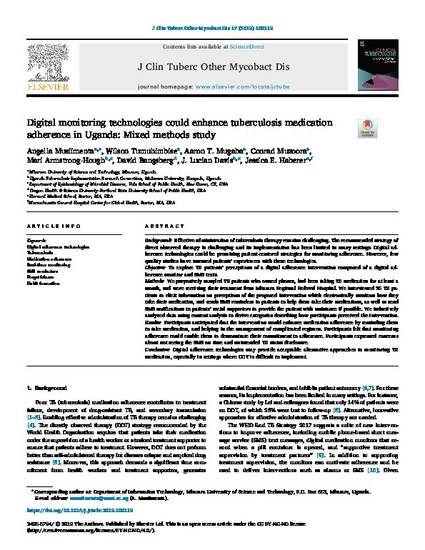
- Tuberculosis Medication adherence,
- Real-time monitoring
Background: Effective administration of tuberculosis therapy remains challenging. The recommended strategy of direct observed therapy is challenging and its implementation has been limited in many settings. Digital adherence technologies could be promising patient-centered strategies for monitoring adherence. However, few quality studies have assessed patients’ experiences with these technologies. Objective: To explore TB patients’ perceptions of a digital adherence intervention composed of a digital adherence monitor and SMS texts. Methods: We purposively sampled TB patients who owned phones, had been taking TB medication for at least a month, and were receiving their treatment from Mbarara Regional Referral Hospital. We interviewed 35 TB patients to elicit information on perceptions of the proposed intervention which electronically monitors how they take their medication, and sends SMS reminders to patients to help them take their medications, as well as send SMS notifications to patients’ social supporters to provide the patient with assistance if possible. We inductively analyzed data using content analysis to derive categories describing how participants perceived the intervention. Results: Participants anticipated that the intervention would enhance medication adherence by reminding them to take medication, and helping in the management of complicated regimen. Participants felt that monitoring adherence could enable them to demonstrate their commitment to adherence. Participants expressed concerns about not seeing the SMS on time and unintended TB status disclosure. Conclusion: Digital adherence technologies may provide acceptable alternative approaches to monitoring TB medication, especially in settings where DOT is difficult to implement.

© 2019 The Authors. Published by Elsevier Ltd.
http://creativecommons.org/licenses/by/4.0/